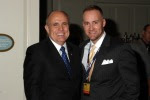Wednesday, September 30, 2009
Sunday, September 20, 2009
Leadership, Restraint and Free Enterprise
On September 18th, Democratic Senator Evan Bayh showed great leadership. He wrote a superbly-timed and sobering Op-Ed piece in the Wall Street Journal. Though no one could argue with his wholly appropriate caution about increasing our discretionary spending while our national debt grows, I'm sure his article went over in Washington like a tax cut in Sacramento. Bayh's popularity among his fellow Democrats in Congress probably took a major hit. That's why he should be applauded by everyone else. What he wrote, in very Midwestern/fly-over language, was undeniable. "On our present course, we violate a fundamental part of our national character by taking from our children to satisfy our desires today," Bayh wrote. "Efficiency and frugality, common virtues in the private sector, must be incorporated into government, " he added.
This is what leaders do. Leaders go against popular sentiment and pressures to "go along to get along." Leaders speak up and take action when they know the present course is wrong. Leaders do what is right in the long-term - no matter how good it might feel to do what is popular in the short-term. Senator Bayh's leadership on this issue is well-earned. As Governor of Indiana, he cut spending, balanced the budget and didn't raise taxes. Perhaps his best paragraph in the article contained this, "we cannot indefinitely share with the less-fortunate resources we do not possess. Ultimately, a growing economy with increased revenues and a stable national balance sheet are the best guarantors of social progress."
What the senator was talking about is a concept that most of us understand - restraining the growth of the federal government. What many of us don't understand is the impact of all forms of government on the free enterprise system. More than 89,000 local, state and federal government entities dine at the table prepared by the private sector. Over the last couple of decades, their appetite has grown. In fact, it is accurate to say that our public sector guests are now quite bloated. They will have trouble pushing themselves away from the table. On September 22, the private sector is going to attempt to do something about this unsustainable predicament. Beginning on 9/22, the free enterprise sector (115 million employees and 5 million companies) attempts to put the government on a diet. Bon appetit.
This is what leaders do. Leaders go against popular sentiment and pressures to "go along to get along." Leaders speak up and take action when they know the present course is wrong. Leaders do what is right in the long-term - no matter how good it might feel to do what is popular in the short-term. Senator Bayh's leadership on this issue is well-earned. As Governor of Indiana, he cut spending, balanced the budget and didn't raise taxes. Perhaps his best paragraph in the article contained this, "we cannot indefinitely share with the less-fortunate resources we do not possess. Ultimately, a growing economy with increased revenues and a stable national balance sheet are the best guarantors of social progress."
What the senator was talking about is a concept that most of us understand - restraining the growth of the federal government. What many of us don't understand is the impact of all forms of government on the free enterprise system. More than 89,000 local, state and federal government entities dine at the table prepared by the private sector. Over the last couple of decades, their appetite has grown. In fact, it is accurate to say that our public sector guests are now quite bloated. They will have trouble pushing themselves away from the table. On September 22, the private sector is going to attempt to do something about this unsustainable predicament. Beginning on 9/22, the free enterprise sector (115 million employees and 5 million companies) attempts to put the government on a diet. Bon appetit.
Subscribe to:
Posts (Atom)











